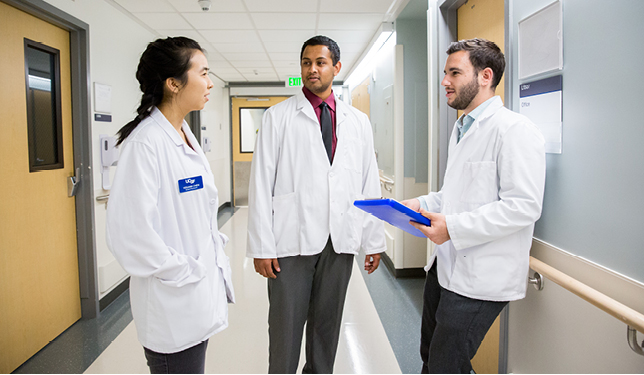
Fellowship Programs
The Center for Intelligent Imaging at UCSF offers unique opportunities for ci2 Summer Fellowships. Since 2019, undergraduates from across the country have come to work on research with 1:1 mentorship from ci2 faculty and researchers on topics covering imaging and classification of disease (cancer, fractures, COVID, etc.), basic research in medicine and machine learning, including the development of new datasets, techniques, and algorithms that extend the state-of-the-art.
The fellowship program allows students to experience intensive hands-on research in medical imaging. Fellows will be paired with a ci2 research group where they can produce or contribute to publishable research over a fast-paced 8-12 week sprint. In the process, fellows will develop an understanding of how their potential career in academic research could take shape and will receive mentorship in pursuing the next steps of their academic and professional journeys.
Program Features
- Work 1:1 with a lab leader to develop research in an area of interest
- Contribute as first author or secondary author to publishable research
- Receive exposure to and mentorship for a potential career in academic research
- Solve essential problems at the intersection of medical imaging and machine learning!
On pause for 2026, please check back at the end of 2026/early 2027
Eligibility
Eligibility Requirements
- A continuing undergraduate student at a degree-granting institution (minimum 2.0 GPA)
- Exposure and interest in applied computer science skills (including Python, Git, Linux, and Matlab)
- Interested in pursuing a career in academic research or graduate school
- U.S. Citizen, U.S. Permanent Resident, or able to obtain an F1/J1 work visa * (see below)
Minimum Student Expectations during Fellowship
- To devote total effort to the research project (Fellows cannot take courses or hold another full-time job.)
- To conduct research primarily in person unless indicated by the project/mentor.
- To participate in the project for a mandatory minimum of 10 weeks.
- To submit an abstract of their project approved by the mentor.
- To submit a written technical report approved by the mentor.
- To give a final oral presentation.
The University of California, in accordance with applicable Federal and State law and University
the policy does not discriminate based on race, color, national origin, religion, sex, gender
identity, pregnancy, physical or mental disability, medical condition (cancer related or genetic
characteristics), ancestry, marital status, age, sexual orientation, citizenship, or service in the
uniformed services.
* Requirements for International Students
If a fellowship or internship offer is made, international students will be given instructions on how to apply for an F-1 or J-1 student visa abroad before participation. International students currently attending a college or university in the U.S. must secure special off-campus employment authorization before participation. F-1 students must apply for Curricular Practical Training (CPT); J-1 students must apply for Academic Training. Please consult an International Student Advisor at your current U.S. institution as soon as you apply to understand your school's requirements and deadlines for authorizing off-campus work authorization. Your home institution must approve CPT, OPT, or Academic Training before beginning the program.
Practical Training for F-1 Students in the U.S.
CPT can be granted through a student's current academic institution and does not require an application for Immigration. Each college or university in the U.S. has established specific guidelines and procedures for authorizing Curricular Practical Training. Students should consult their current international advisor as soon as the application process begins.
OPT requires the student to submit an employment authorization application directly to Immigration. The application process requires a new I-20, endorsed by the student's current international advisor, for OPT. When the application is approved, Immigration will send the student an Employment Authorization Document (EAD). Students may NOT participate until the EAD is received. Because Immigration may take three months or more to process an OPT application, students are encouraged to consult their current international advisor as soon as they apply to the program.
Academic Training for J-1 Students in the U.S.
Academic Training can be granted through a student's current academic institution and does not require an application for Immigration. Each college or university in the U.S. has established specific guidelines and procedures for authorizing Academic Training. Students should consult their current international advisor as soon as they apply. If, after consulting with their current international advisor, you have additional questions about employment authorization, for more information please email Annie (Pei-Ting) Liu.
